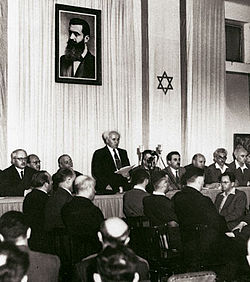««« |
| |||||
| ||||||
Events in the year 1948 in Israel .
««« |
| |||||
| ||||||
Events in the year 1948 in Israel .

The State of Israel was declared after the end of the civil war, which was raging for six months in Palestine after the vote by the United Nation to partition Palestine between Palestinian Jews and Arabs.
Declaration of independence and international recognition:
1948 Arab–Israeli War:
Other events:
| | This section is empty. You can help by adding to it. (August 2010) |